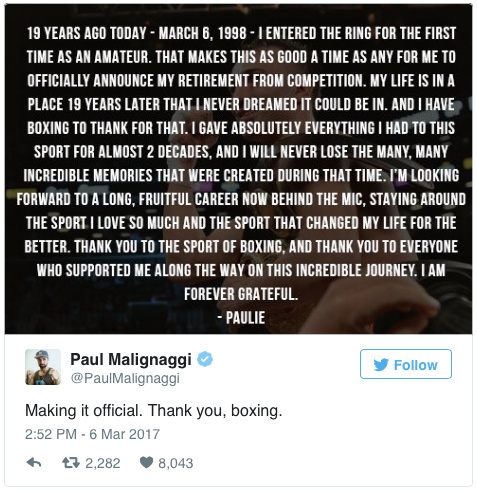A quick left-hook to the body put Paulie Malignaggi onto the canvas last weekend, and his career fighting in the ring went down along with it. The almost 17-year veteran was counted out at 1:50 of the 8th round after putting up a spirited fight against Britain’s Sam Eggington, where Malignaggi was actually up on two of the judges’ scorecards before the stoppage. During the post-fight interview, the Brooklyn native was gracious in defeat, making mentions of retirement, and that he would instead focus on commentating, a job to which he has excelled quite impressively.
“I could see [Eggington] improving as the fight progressed. He got better, made adjustments during the fight. So, if there’s a silver lining to this fight, if I can’t win the fight, I feel good knowing that my role as a wily veteran helped make a younger fighter get better,” said Malignaggi. “I didn’t want to make a choice before the fight, but I feel like I’ve got a great job watching young fighters come up from ringside and living through them. I hope I have that job for years to come. I probably am done (boxing).”
Videos by VICE
For those who have been around the sport long enough, boxing retirements aren’t exactly the most permanent things, and this isn’t the first time Malignaggi has publicly alluded to such a decision either. After his loss to Danny Garcia in 2015, I wrote a farewell piece to the fighter after he had given hints to hanging them up, but the Italian-American went on to win three straight bouts right after, and was speculated to be in line for a EBU title shot should he have emerged victorious last weekend.
It seems, however, that this time around the decision is much more serious, as the boxer took to social media two days later and made an official announcement, apparently on his 19th anniversary as a pugilist.

“19 years ago today – March 6, 1998 – I entered the ring for the first time as an amateur. That makes this as good a time as any for me to officially announce my retirement from competition. My life is in a place 19 years later that I never dreamed it could be in. And I have boxing to thank for that. I gave absolutely everything I had to this sport for almost 2 decades, and I will never lose the many, many incredible memories that were created during that time. I’m looking forward to a long, fruitful career now behind the mic, staying around the sport I love so much and the sport that changed my life for the better. Thank you to the sport of boxing, and thank you to everyone who supported me along the way on this incredible journey. I am forever grateful.”
There are few others in boxing that speak with such grace, and Malignaggi is the epitome of how the sport can be used as a social good. His father left him at the age of 6, was thrown out by his stepfather at 15, and started boxing to make something of himself. He won the Golden Gloves in his first four amateur fights, and became an instant prodigy. Good looks and a ballsy New York attitude made him marketable, and his speed and defensive reflexes made him virtually untouchable in his early career. Those two attributes deteriorate with age, however, and at 36, his legs are no longer what they used to be. Power punchers can sometimes get away with fighting past their time, but power is one thing that Malignaggi lacked.
Of his 36 wins, Malignaggi has 7 KOs, leaving him with a KO ratio of 16%. That’s not the most intimidating set of stats, but consider that he’s taken those numbers and faced guys like Miguel Cotto, Ricky Hatton, Amir Khan, Vyacheslav Senchenko, Zab Judah, Juan Diaz, Danny Garcia, Shawn Porter, and Adrien Broner. That roster is not exactly the most pleasant walk in the park. He’s also been the underdog going into all of those fights, emerging victorious three times (Diaz II, Senchenko, Judah). So in terms of legacy, skill or records, Malignaggi may not rank amongst boxing’s best, but when it comes to heart, courage and all around respect for the sport, there are few that come close.
He’s also been unafraid to live his own truth both inside and outside of the ring. First are the flamboyant hairstyles he carries into fights, anything from frosted tips to cornrows, and in his bout against Lovemore N’dou in 2008, he became the only fighter I’ve ever seen to receive a haircut during a fight. Then there are the unabashed criticisms against the boxing establishment, such as his post-fight outburst after his controversial loss in his first encounter with Juan Diaz. In a sport like boxing, voices like that are needed. Finally, there are the subtle ways he treats others in the fighting community, like how he honored the memory of Ronnie Vargas, a budding professional prospect who lost his life to gun violence. At the funeral, Malignaggi gave his IBF belt to Ronnie’s father, just so his son could be buried a champion.
In Showtime’s documentary “Magic Man”, it begins with Malignaggi reciting a quote from boxing scribe FX Toole:
“Boxing is the magic of men in combat, the magic of will, and skill, and pain, and the risking of everything so you can respect yourself for the rest of your life.”
When looking at the life and career of Paulie Malignaggi, I’d say with confidence that he’s certainly earned that life-long respect for himself. I’d also say that he’s earned that same measure of respect from just about everyone in boxing.
More
From VICE
-

Screenshot: The Game Awards -

(Photo by Ethan Miller/Getty Images) -

Sarah Stier/Getty Images -

Netflix
